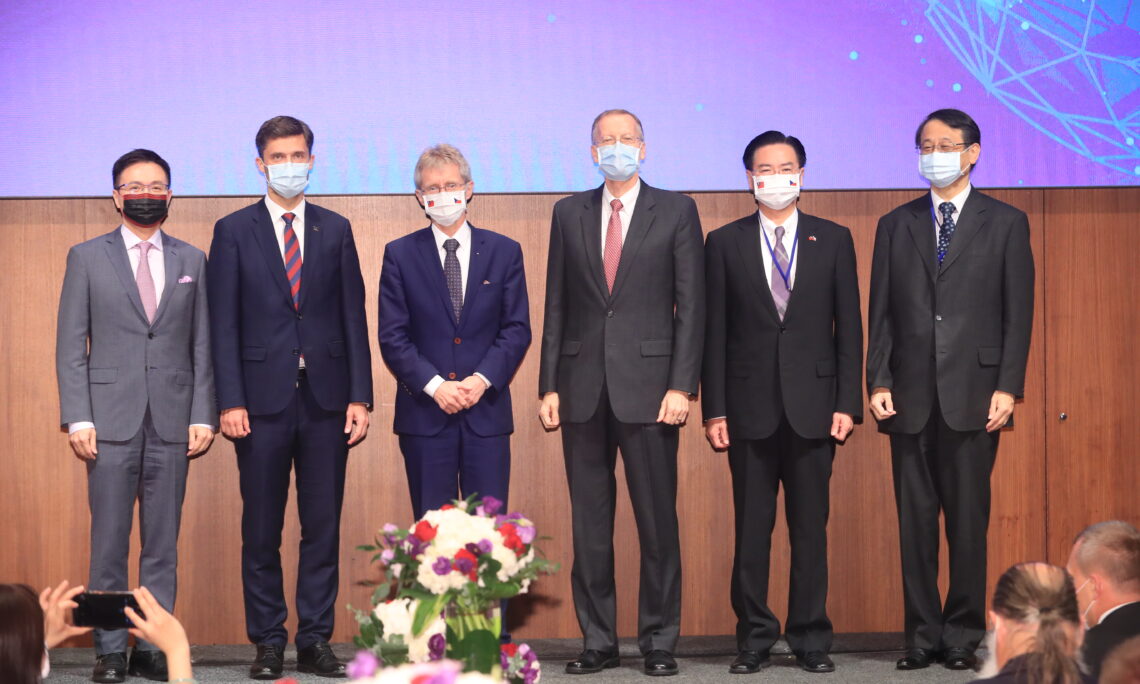OT-2036
September 4, 2020
Remarks by AIT Director W. Brent Christensen at the
Forum on Supply Chain Restructuring: Improving Resilience Amongst Like-Minded Partners
September 4, 2020
(as prepared for delivery)
Senate President Vystrčil, Minister Wu, Representative Grzegorzewski, Representative Izumi, TAITRA Chairman Huang, distinguished guests, good afternoon. We are delighted that this delegation from the Czech Republic made this visit to Taiwan despite the many challenges, both logistical and political. We commend Senate President Vystrčil for his vision and leadership.
I would like to first share some good news with the delegation: Just last week, the American Institute in Taiwan (AIT) and Taiwan’s Representative Office in the United States issued a joint declaration on 5G security, echoing the Prague Proposals, a set of guidelines were so important for developing a common approach to 5G network security adopted at the landmark conference hosted by your government in May 2019.
Senate President Vystrčil and his delegation’s visit to Taiwan showcases Taiwan’s significance in so many areas that are vital to our future prosperity and national security. Supply chain resiliency is just one of the areas in which Taiwan will play a key role in the post-COVID-19 era.
The American Institute in Taiwan is pleased to co-host this Forum with our likeminded partners to discuss this very important question: How can we work together to improve the resilience of our supply chains to both prevent and prepare for future crises?
The COVID-19 pandemic has exposed the risks of relying too much on a single country or supplier for critical materials like medical supplies and pharmaceuticals and for inputs for strategically important industries. The U.S. government is undertaking a whole-of-government approach to address supply chain restructuring. We know this is a challenge faced by everyone in this room, and we want to cooperate on this difficult but important undertaking. Our shared interests and shared values make us natural partners, and we believe we will be stronger and more effective if we work together.
As we plan for a post-pandemic world and evaluate what changes to the global supply chain are necessary, one thing is certain: Taiwan has demonstrated time and again that it is a reliable partner and a critical player for moving toward a more sustainable global economy. Taiwan’s ability to manage the pandemic is impressive. But equally impressive – and truly inspiring – is Taiwan’s ability and willingness to offer assistance to the United States and other countries around the world in dealing with the pandemic.
Over the past eight months, the American Institute in Taiwan has engaged with counterparts in the Taiwan government, industries, and academia to explore how we can work together on supply chain restructuring. I urge Taiwan to capitalize on the unique opportunity to join the effort to reshape global supply chains for the betterment of the world.
We know that Taiwan is already at the center of regional high-technology supply chains. Taiwan firms are the leading industry players that helped to develop ICT and other supply chains in the PRC over 30 years ago. However, in contrast to PRC companies, Taiwan firms adhere to the rule of law and protect intellectual property.
Many firms, including Taiwan businesses, have begun to seek alternative production and manufacturing hubs as they increasingly recognize the dangers of linking their futures to the PRC. The Taiwan Ministry of Economic Affairs has already found success in business reshoring programs, which have attracted more than US $33.3 billion of investment back to Taiwan since the program was launched in January 2019.
However, not every Taiwan company operating in the PRC can easily be brought back to Taiwan. There simply isn’t enough space, energy or labor. As a result, many Taiwan firms are seeking partnerships in the United States and in other like-minded economies to build out the new supply chains of the future.
Helping economies, sectors, and companies to build out secure supply chains will require a coordinated effort from all of us. We hope today’s event will represent progress in that difficult but critical process.
As many of you know, earlier this week, the United States announced that we will be launching an Economic and Commercial Dialogue with Taiwan. The United States wants to strengthen our bilateral economic ties across a range of priority issues, and reorienting technology and medical product supply chains is at the top of the list.
Before I close, I want to return to the topic of our shared values. Supply chain restructuring would seem to be chiefly concerned with national interests, especially economic interests to ensure our supply always meets our demand. But the factor that makes the parties in this room especially good partners for such a high-stakes undertaking is actually shared values.
Like Taiwan, the Czech Republic has dazzled the world by transforming itself into one of the world’s most vibrant democracies and successful economies. Both places have come to symbolize how the spark of democracy and innovation can be kept alive under any circumstances. Both places inspire both their neighbors and countries around the world to be freer and more prosperous.
And all of us in this room are connected by our shared values. These include our political values: equal protection under the law; respect for human rights; the freedoms of press, expression, and religion.
They include our economic values: free markets; private sector-driven, sustainable growth; innovation and entrepreneurship; respect for intellectual property rights; and compliance with international rules.
And these include our international values: seeking to resolve global problems and providing international assistance, humanitarian aid, and exporting solutions rather than problems.
These are the shared values that will inform how we reinvent the supply chains of the future.
Once again, I thank the European Economic and Trade Office, Japan-Taiwan Exchange Association, Taiwan Ministry of Foreign Affairs, Taiwan Ministry of Economic Affairs, and Taiwan External Trade Development Council for co-hosting such an important forum with us and for embarking with us as partners on this path together.
Thank you very much.
















![Video Thumbnail [Recovered]-01](../wp-content/uploads/sites/269/Video-Thumbnail-Recovered-01-1-750x450.jpg)





